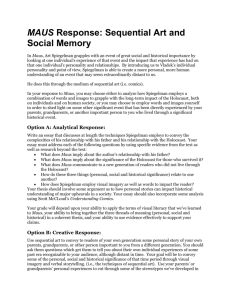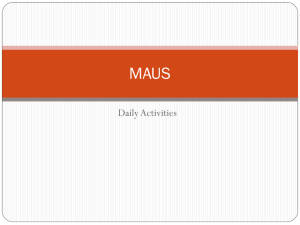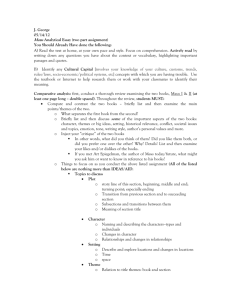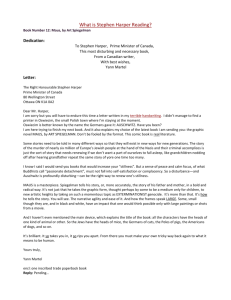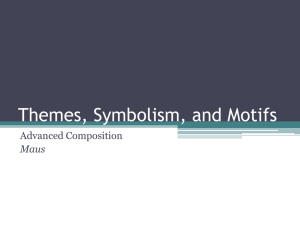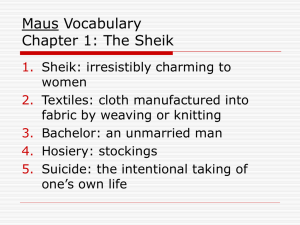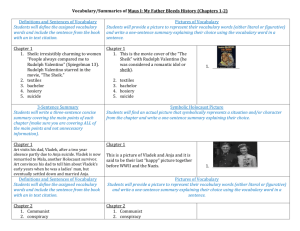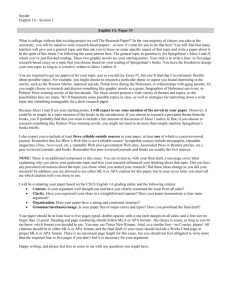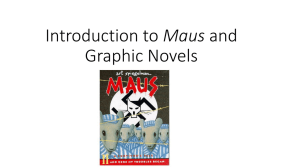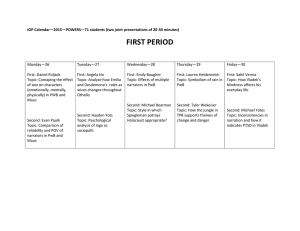ENG 074 College Reading Maus Reading Project Selection Project
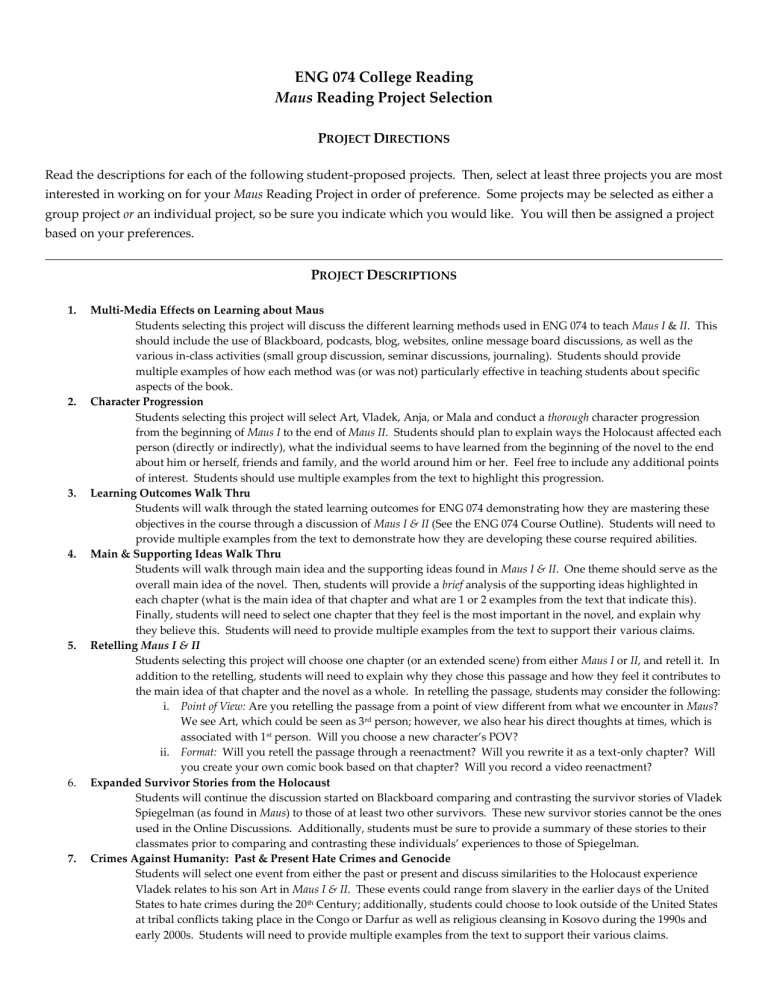
ENG 074 College Reading
Maus Reading Project Selection
P ROJECT D IRECTIONS
Read the descriptions for each of the following student-proposed projects. Then, select at least three projects you are most interested in working on for your Maus Reading Project in order of preference. Some projects may be selected as either a group project or an individual project, so be sure you indicate which you would like. You will then be assigned a project based on your preferences.
P ROJECT D ESCRIPTIONS
1.
Multi-Media Effects on Learning about Maus
Students selecting this project will discuss the different learning methods used in ENG 074 to teach Maus I & II. This should include the use of Blackboard, podcasts, blog, websites, online message board discussions, as well as the various in-class activities (small group discussion, seminar discussions, journaling). Students should provide multiple examples of how each method was (or was not) particularly effective in teaching students about specific aspects of the book.
2.
Character Progression
Students selecting this project will select Art, Vladek, Anja, or Mala and conduct a thorough character progression from the beginning of Maus I to the end of Maus II. Students should plan to explain ways the Holocaust affected each person (directly or indirectly), what the individual seems to have learned from the beginning of the novel to the end about him or herself, friends and family, and the world around him or her. Feel free to include any additional points of interest. Students should use multiple examples from the text to highlight this progression.
3.
Learning Outcomes Walk Thru
Students will walk through the stated learning outcomes for ENG 074 demonstrating how they are mastering these objectives in the course through a discussion of Maus I & II (See the ENG 074 Course Outline). Students will need to provide multiple examples from the text to demonstrate how they are developing these course required abilities.
4.
Main & Supporting Ideas Walk Thru
Students will walk through main idea and the supporting ideas found in Maus I & II. One theme should serve as the overall main idea of the novel. Then, students will provide a brief analysis of the supporting ideas highlighted in each chapter (what is the main idea of that chapter and what are 1 or 2 examples from the text that indicate this).
Finally, students will need to select one chapter that they feel is the most important in the novel, and explain why they believe this. Students will need to provide multiple examples from the text to support their various claims.
5.
Retelling Maus I & II
Students selecting this project will choose one chapter (or an extended scene) from either Maus I or II, and retell it. In addition to the retelling, students will need to explain why they chose this passage and how they feel it contributes to the main idea of that chapter and the novel as a whole. In retelling the passage, students may consider the following: i.
Point of View: Are you retelling the passage from a point of view different from what we encounter in Maus?
We see Art, which could be seen as 3 rd person; however, we also hear his direct thoughts at times, which is associated with 1 st person. Will you choose a new character’s POV? ii.
Format: Will you retell the passage through a reenactment? Will you rewrite it as a text-only chapter? Will you create your own comic book based on that chapter? Will you record a video reenactment?
6.
Expanded Survivor Stories from the Holocaust
Students will continue the discussion started on Blackboard comparing and contrasting the survivor stories of Vladek
Spiegelman (as found in Maus) to those of at least two other survivors. These new survivor stories cannot be the ones used in the Online Discussions. Additionally, students must be sure to provide a summary of these stories to their classmates prior to comparing and contrasting these individuals’ experiences to those of Spiegelman.
7.
Crimes Against Humanity: Past & Present Hate Crimes and Genocide
Students will select one event from either the past or present and discuss similarities to the Holocaust experience
Vladek relates to his son Art in Maus I & II. These events could range from slavery in the earlier days of the United
States to hate crimes during the 20 th Century; additionally, students could choose to look outside of the United States at tribal conflicts taking place in the Congo or Darfur as well as religious cleansing in Kosovo during the 1990s and early 2000s. Students will need to provide multiple examples from the text to support their various claims.
8.
Historical Fact Checkers
Following political debates, fact checkers scrub the speeches to see how accurate the claims of each politician are and are not. Students selecting this project will analyze the events of World War II and the Holocaust as presented by Art and Vladek Spiegelman to determine the accuracy of this survivor story. Students will need to provide multiple examples from the text to support their various claims.
P ICK Y OUR P ROJECT
List the projects in order of preference and circle whether you want to work on that project in a group or individually.
My Order of Preference is…
1.
__________
G ROUP / I NDIVIDUAL
2.
__________
3.
__________
G ROUP
G ROUP
/
/
I
I
NDIVIDUAL
NDIVIDUAL
4.
__________
G ROUP / I NDIVIDUAL
5.
__________
G ROUP / I NDIVIDUAL
P ROJECT T IME L INE
1.
Thursday, 8 March: You will be assigned your project and (if applicable) your group members
2.
Spring Break (10-18 March): Prepare a detailed project proposal with the members of your group
Students will write a detailed proposal of how they plan on completing their project. This proposal will need to include an outline of their project, any outside sources they plan to use, and the method they plan to use to complete their project (Power Point, videos, creating their own comic, reenactment, etc). Additionally, groups will need to include the roles each member will perform and the general responsibilities each person has within his or her group.
3.
Tuesday, 20 March: Project Proposal Turn In
4.
TBD: Library Presentation
5.
Tuesday 27 March: Presentations Begin
O THER P ROJECT -R ELATED C ONCERNS
1.
Students will be required to present for no less than 3 minutes and no more than 5 minutes per person. For example, a group of 3 students will need to present their project for a minimum of 9 minutes but no more than 15 minutes.
2.
Students will be required to write up a quiz for the audience members. This quiz should be brief and cover the major points of your presentation, and should be something students can complete during your presentation. It can take any form you like (short answer, fill in the blank, multiple choice, true false, or matching) except for essay format.
3.
Students will be required to provide a self-evaluation of their work as well as the work of the group members once presentations are complete.
